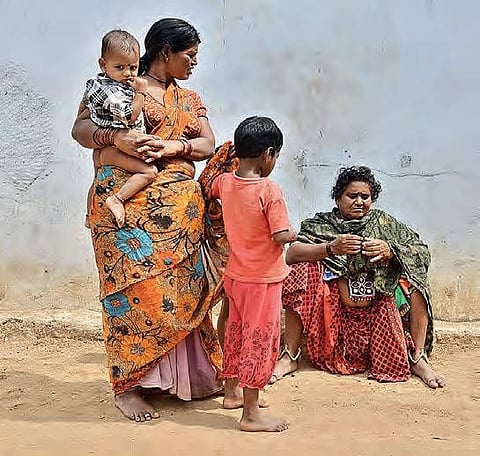

DEVARAKONDA: Chitti is 24 years old and is pregnant for the fifth time. Her first child, a boy, died due to some health complications after which she had a girl, who is now six. Sitting in the Integrated Child Development Services (ICDS) centre in Palugu Thanda, a Lambada hamlet in Devarakonda of Nalgonda district, Chitti shares her story.
She had another boy and girl, who are now four and two years old, respectively. She was pregnant with a boy after that but he too died. “My husband and in-laws insist that we have another boy so that we are assured of a male heir. What if my elder son too dies due to some complication?” she asks. Her husband is an auto driver.
Shanthi too is of the same age, and has been pregnant four times. She has two daughters and one son.
“This is common in Devarakonda, dominated by Scheduled Tribes of the Lambada caste and they believe that having male children is a way of life. They will go to any extent to have not just one,” says E Lakshmi, caretaker at the centre.
Devarakonda in Telangana notorious for abandoning and killing of girl children right after birth. To stop female this, the erstwhile Andhra Pradesh government introduced the Cradle Baby Scheme in 2007 based on the Tamil Nadu government’s initiative in 1992. It was an attempt to find a home abandoned girl children and encourage parents not to kill them.
“It never happened in this thanda,” claims Lakshmi, even before you ask her anything. She, however, tells us that discrimination against girl children is rampant.
“I was appointed as the District Welfare Officer on October 11 and since then we intervened in 10 cases,one female foeticide. The rescued children were admitted to Shishu Vihar,” says Pushpalatha from the Women, Child, Disabled and Senior Citizen Department.
Lakshmi explains, “First they feel sorry for having just one boy and then they are also treated differently. They are sent to a private school, especially now as that is the norm. They ensure that they are all prim and proper, in a finely-pressed uniform and shiny shoes. Girls, on the other hand are sent to the village ICDS centre upto the age of six,” while she points to Nikitha and her sister who are both waiting for the mid-day meals to be served.
The girls are supposed to attend to chores at home. “They deliver lunch to their fathers on priority. Going to school is a choice. There is no pressure, neither is there encouragement,” adds Lakshmi. These girls are also forced to take care of their younger siblings while parents go for work. “If the boy is the eldest, then he will be in school or at least playing in the fields, free of any responsibility,” says Lakshmi.
That the deference to the male child is ingrained becomes quite evident as Nikhita and her sibling shift in their positions as soon as the boys enter the ICDS premises to get their meals. “They are also concerned about the boy’s company. If there is just one boy in the house, they want another as support for each other,” Lakshmi says.
More Lambada women gather at the ICDS centre as it is time for meals. They are all dressed in chiffon sarees except for 60-year-old Somili Nenavath who is in her traditional attire — bangles from her arms to the wrists, huge jhumkas, and her mirrored lehenga and choli and Lakshmi observes, “They are modern in terms of their dressing, but their perspective on the girl child is still the same.”
Focus on girl child to fight discrimination
Pushpalatha, District Welfare Officer, Nalgonda, informs that, Gaurav Uppal, the newly appointed district collector, is moving ahead with special focus on saving the girl child, in sync with the national campaign. “A committee has been constituted for a new programme titled ‘Mana Inti Lakshmi’, where I am the coordinator along with eight other women district level officers. The committee is called Balika Vikasa Brundam,” Pushpalatha tells us.
Objective of scheme
Though sale of girl child and female feoticide has comparatively decreased, Pushpalatha says, “Only two weeks ago, a couple sold off their fourth girl child only as they weren’t financially equipped. The idea is to spread awareness and to educate people about the various schemes available for girl children from the time they are in the womb till they get married. The programme is in sync with all line departments — health, panchayat raj, BC welfare, tribal welfare, labour department and social welfare. We want to tell the parents that a girl child is not a burden. They shouldn’t fear the birth of a girl child,” explains Pushpalatha.
Workshops and awareness programmes will be conducted across the district, mandal wise and parents and families will be approached individually too if possible. “If there is need for intervention, that will also be done,” adds the officer.